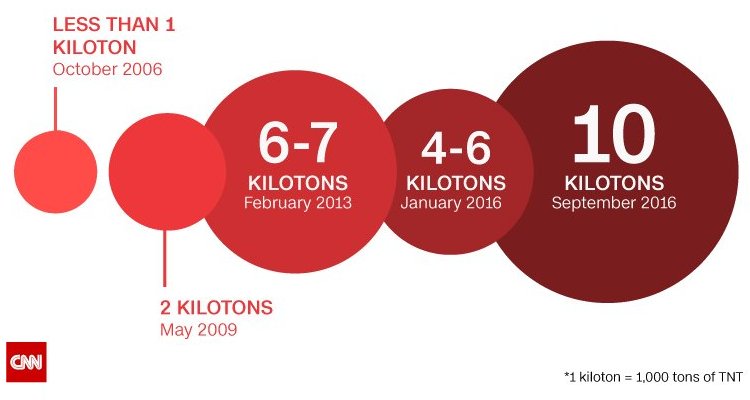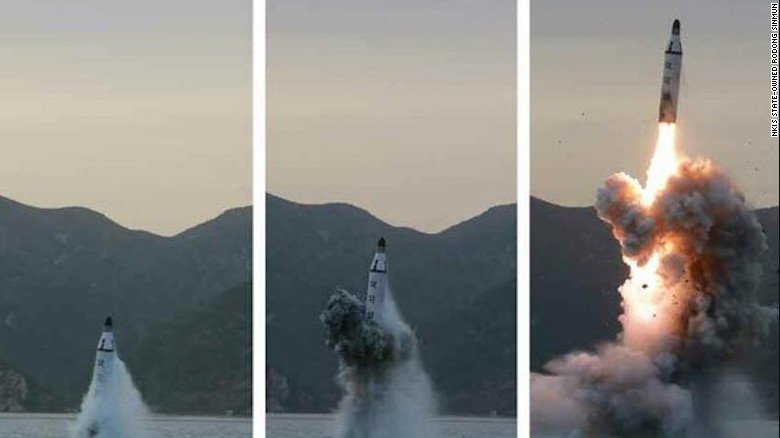
Could North Korea actually put a nuclear warhead atop a rocket and fire it at a potential adversary?
Some still doubt North Korea can make a warhead small enough, or miniaturize it enough, to mount atop a missile. But that's what North Korea said it proved Friday.
South Korean monitors said Friday's nuclear test had a yield equivalent to 10 kilotons of TNT, which would make it North Korea's most powerful of five tests to date.
That blast came just days after North Korea test-fired three ballistic missiles, which landed in Japan's Air Defense Identification Zone, about 155 miles (250 kilometers) from a Japanese island. Last month, a missile fired from a submarine also landed in the same zone.

"They've been demonstrating not just the ability to cause a nuclear detonation, but to mount it and turn it into a weapon," said John Delury, an assistant professor of East Asian studies at Yonsei University in South Korea.
"If there's evidence that they can do that -- or they have done that -- then this is a major concern for the region," Alexander Neill, a North Korea expert at the International Institute for Strategic Studies Asia, said.
Friday's nuclear test was North Korea's second this year, something that shows North Korea is "mastering the technology," said Lassina Zerbo, executive secretary of the Comprehensive Nuclear-Test-Ban Treaty Organization.
But analysts say there's no way to determine the extent of North Korea's missile technology until they actually use it.
 Images published by North Korean state media purport to show a submarine-launched ballistic missile (SLEM) off the eastern coast of the Korean peninsula on Saturday, April 23, 2016. Five days later, South Korea claims the North launched two more missiles on April 28 that failed. |
"We can't learn anything about the physical size of the device," said Melissa Hanham, senior research associate at the James Martin Center for Nonproliferation Studies in Monterey, California.
"My deep fear is that they will launch a live nuclear weapon on one of their missiles," Hanham said. "It would be hard for Japan, China, the US, to know that it was a test and not the real thing. ... That would be extremely dangerous as that could trigger a war."
Reaction was swift and harsh around the world after Friday's test with the United States, Russia, South Korea, and even China, with whom North Korea shares a border and a long but frayed diplomatic relationship, denouncing it.
Japanese Prime Minister Shinzo Abe called Friday's test "a significant threat to the safety of our country."
Christopher Hill, the former US ambassador to South Korea, said Friday it's time to stop guessing about North Korea's capabilities and start planning a response.
"Before long, I think they're going to have a nuclear warhead on a missile and we have to look really carefully and see what we're going to do," said Hill, who was the top U.S. diplomat in Seoul from 2004 to 2005.
Hill said the world can't expect North Korea to bow to further sanctions or even be open to new negotiations over its nuclear program.
"I wouldn't make bets on whether Kim Jong Un would be a reasonable guy," Hill said. "I don't put it past them to threaten countries and suggest that they will be prepared to launch a nuclear strike."
The solution may come in an alliance with China, said Hill, who was also assistant secretary of state for east Asian and Pacific affairs from 2005 to 2009.
"I think we need to sit down with the Chinese ... and say together we need to solve this," Hill said of North Korea's weapons program.
"What direct means we can take to either slow it down or kill it?"
Philip Yun, executive director of the Ploughshares Fund, an organization that aims to eliminate nuclear weapons, also said the world cannot delay a response to North Korea's testing.
"Unless we figure out a way to deal with North Korea and stop their activity, at some point in the near future they're going to have a relatively sophisticated nuclear arsenal that is capable of hitting the United States and that is a huge problem," Yun said.